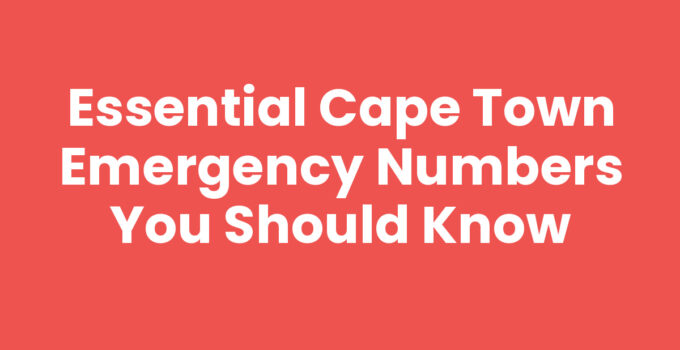Cape Town, one of the most beautiful cities in South Africa, boasts stunning landscapes, a rich history, and a vibrant culture. However, like any major city, it’s essential to be prepared for emergencies. Knowing the correct emergency numbers can make all the difference in times of crisis. In this guide, we’ll detail the most critical Cape Town emergency numbers and provide tips for handling different types of emergencies.
Cape Town Emergency Numbers: What You Need to Know
In any emergency, having quick access to the right contact numbers is crucial. Here’s a comprehensive list of important Cape Town emergency numbers:
- Police (SAPS): 10111 – for reporting crimes in progress or emergencies.
- Ambulance Services: 10177 – for medical emergencies or if you need urgent medical help.
- Fire Services: 021 590 1900 (City of Cape Town) – to report fires or request firefighting assistance.
- Emergency Medical Services: 0800 022 131 – national toll-free service for medical emergencies.
- Metro Police: 021 480 7700 – for reporting traffic incidents or public safety issues.
- Sea Rescue: 021 934 1099 – for emergencies related to the sea, including boating accidents.
- Poison Control: 0861 555 777 – for emergencies related to poisoning or toxic substances.
It’s also wise to keep the contact information of your personal doctor or any local clinics nearby, as they can provide quicker medical assistance in less severe situations.
Recommended Guide: Discover the Best Cape Town Apartment Rentals for Your Stay
How to Stay Prepared for Emergencies in Cape Town
Preparation is key when it comes to handling emergencies effectively. Here are several steps you can take to ensure your safety and the safety of those around you:
Maintain an Emergency Contact List
Compile a list of important contact numbers, including all the emergency numbers listed above, as well as family members, friends, and neighbors. Keep this list in a visible place in your home and save these contacts in your mobile phone under “Emergency Contacts.”
Invest in a First Aid Kit
Having a well-stocked first aid kit can help you deal with minor injuries immediately. Ensure your kit contains band-aids, antiseptics, gauze, scissors, and any necessary medications. Regularly check your kit to ensure items are not expired.
Awareness and Training
Consider taking a first aid and CPR course. Knowledge of how to respond in medical emergencies can truly save lives. Familiarize yourself with emergency procedures and drills conducted in your area, whether for natural disasters or other emergencies.
Further Reading: Discover the University Of Cape Town Map: A Complete Guide
What to Do During an Emergency
When faced with an emergency, staying calm is paramount. Follow these basic steps:
Assess the Situation
Evaluate what kind of emergency you are dealing with. Is it a medical issue, a fire, or a crime? Understanding the severity of the situation will help you determine the necessary action.
Contact the Relevant Authorities
Once you’ve assessed the situation, contact the appropriate emergency number. Remain calm and provide clear, concise information about the emergency. Be prepared to answer questions that will help the responders assist effectively.
Provide Assistance if Safe
If it is safe and you are able, provide assistance to those affected. This might mean performing CPR, administering first aid, or helping people evacuate an area.
Conclusion
Knowing the Cape Town emergency numbers and being prepared for emergencies can help ensure the safety of you and your loved ones. Familiarize yourself with local services, keep important phone numbers handy, and consider taking proactive measures to equip yourself for any situation. Stay safe, Cape Town!
Recommended Guide: Exploring the Cape Town Parliament: A Historic Landmark
Frequently Asked Questions
What is the general emergency number in Cape Town?
The general emergency number for police in Cape Town is 10111.
How can I contact ambulance services in Cape Town?
You can contact ambulance services in Cape Town by dialing 10177.
What should I do if I'm involved in a car accident?
If involved in a car accident, assess for injuries, call the police, and contact emergency services if needed.



